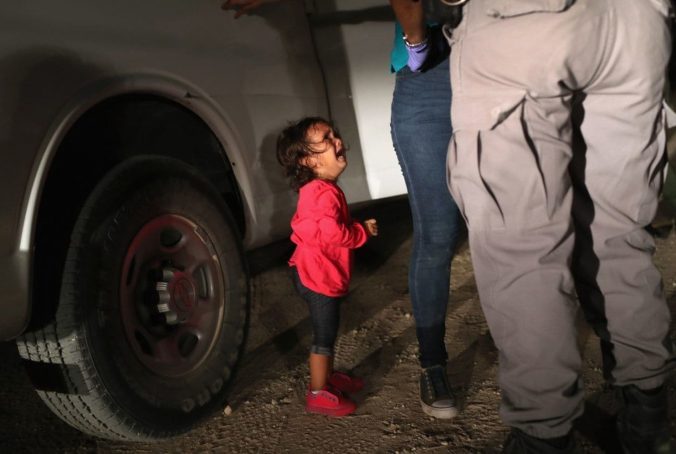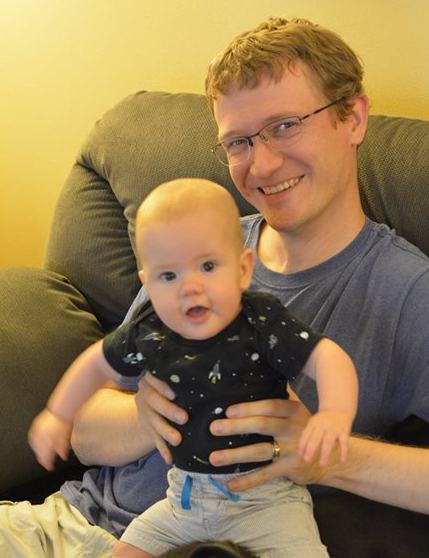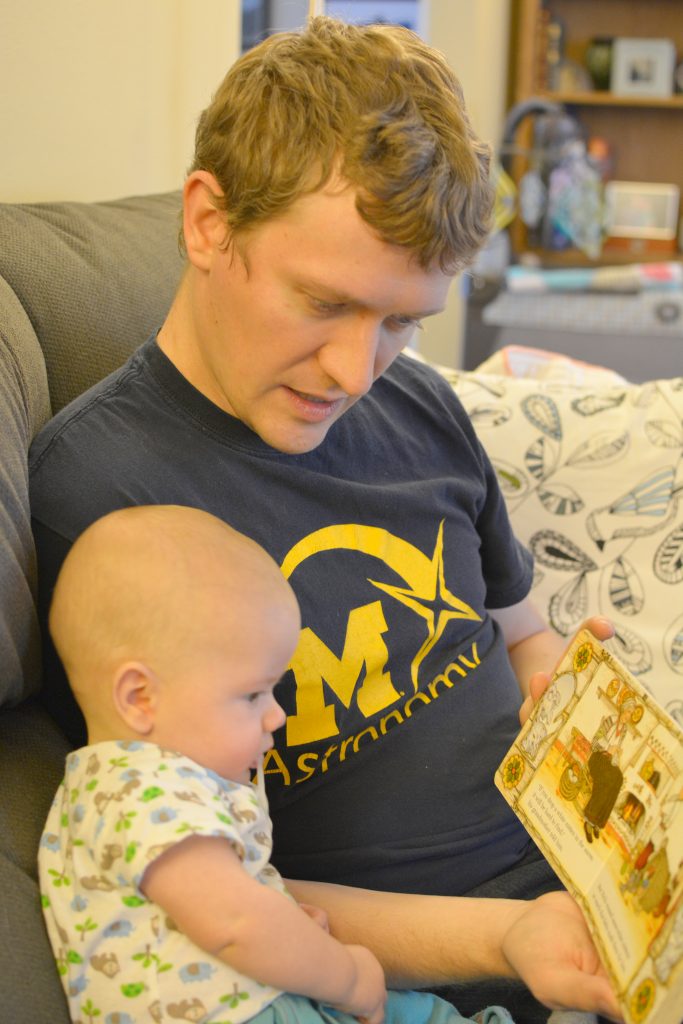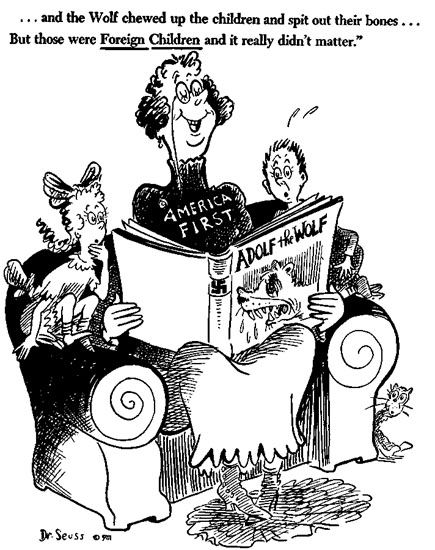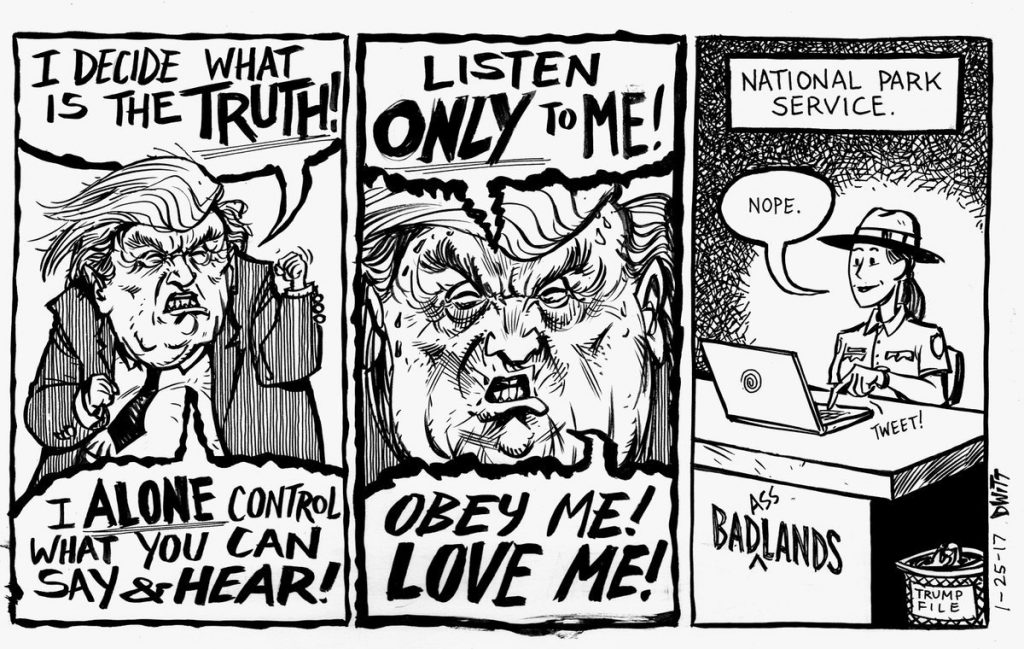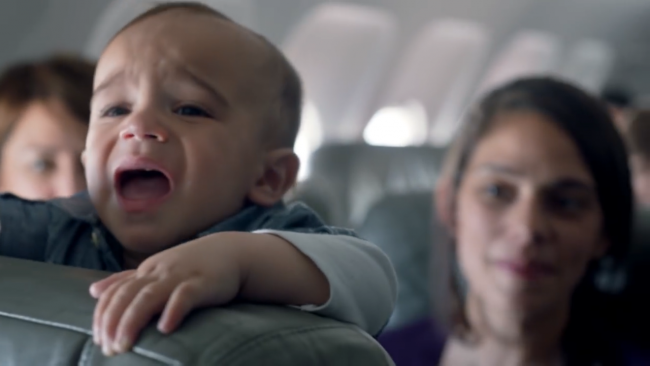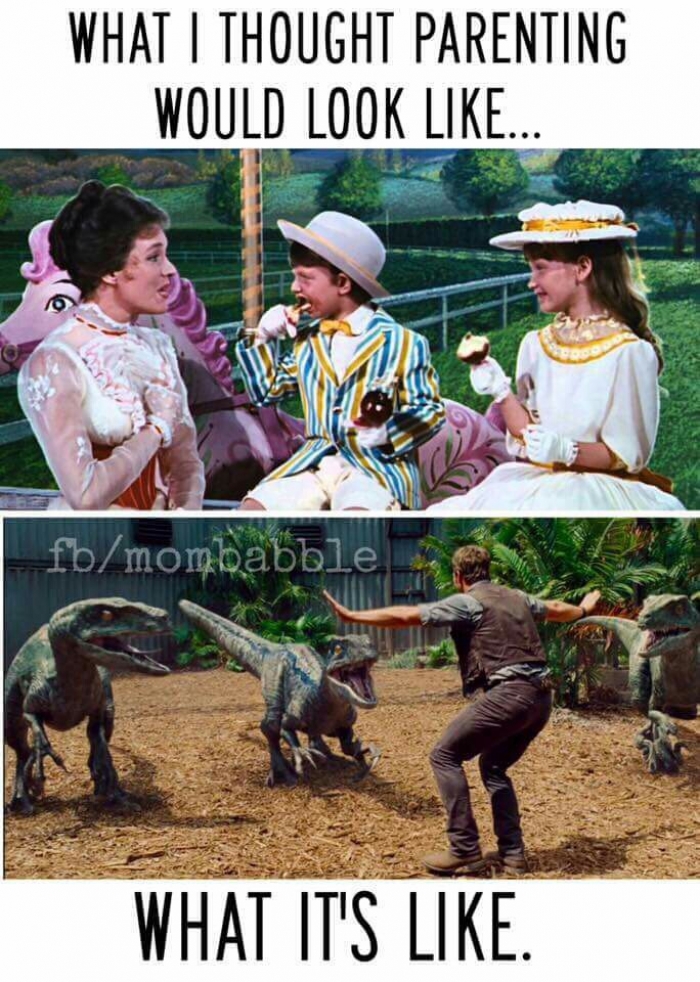Frodo: I wish none of this had happened.
Gandalf: So do all who live to see such times, but that is not for them to decide. All we have to decide is what to do with the time that is given to us. There are other forces at work in this world, Frodo, besides the will of evil.
A few weeks ago, I wrote a furious blog post about anger. I was livid about the impending confirmation of Kavanaugh to the Supreme Court. I was so stressed I was not sleeping well, during a week when I was already sick, and I needed to write to get some of the emotion out of my head and onto the page.
The post had some good writing in it, if I may say so. I talked about how the anger of the Right is a petty and insular anger, a defensive curling-inward, seated in fear of losing a privileged place in society. I contrasted that with the anger of the Left, and particularly of those who have not traditionally held power. I had fun with the image of liberal anger as a volcanic eruption, long dormant but growing beneath the surface, unstoppable once unleashed and leaving the world changed but fertile, ready for new growth to replace what was burned away.
It was cathartic to write, but I took it down after posting it for less than a day. If I’m being honest, it was a bit over the top. I decided that, in the midst of all the negativity, my righteous anger was not was the world needed at that time.
After taking down the post I asked myself a question: Why am I so angry? What is it about Trump and the Republicans that bothers me at such a visceral level that not only do I rage about it ad nauseum on social media, but it has driven me to become a genuine political activist, attending rallies and canvassing for the Democratic party?
Believe me, I have a lot of other things I would rather do with my limited free time. None of this is fun for me. I’m an introvert. I avoid conflict. I hate inconveniencing others. So activities like canvassing are very draining for me. I would much rather write and talk to people about things like my adorable toddler, or good books and movies, or cool science. I have a dozen other hobbies or interests that I’d love to spend my time on. But instead I am pouring my energy and time into politics.
Why? Why am I so angry and stressed out that I can’t sleep at night? Why not ignore politics and enjoy my life again?
These questions have been rattling around in my head since I took down that furious blog post, and I think I’ve finally figured out the crux of the matter. It’s because the modern Republican party is diametrically opposed to two of my most deeply-held core values: Truth and Empathy.
Truth
“The truth may be puzzling. It may take some work to grapple with. It may be counterintuitive. It may contradict deeply held prejudices. It may not be consonant with what we desperately want to be true. But our preferences do not determine what’s true.”
―
As a scientist, I’ve dedicated my life to truth. My worldview is built on the idea that we can understand the world around us, even when it behaves in unexpected or counterintuitive ways, by observing, testing hypotheses, and making corrections when we find out that we were wrong. Science has also given me a healthy appreciation for how unbelievably much there is to know in the world. Nobody can be an expert in everything (alas), so we have to trust in the expertise of others while still thinking critically and, as Sagan famously said, demanding extraordinary evidence to back up extraordinary claims.
The corollary of placing a high value on truth is placing a high value on honesty. During the 2016 election I went so far as to make this figure comparing the prominent politicians from the two major parties. There are two notable things here. The first is that yes, both parties misrepresent the truth or outright lie more than I would like. But the difference in the extent to which they lie is striking. Trump barely seems capable of telling the truth, but Pence and Romney are not far behind despite their more “traditional” political personas. The contrast between Trump and Clinton, especially in the blatant lies, is frankly breathtaking. If you were to set ideology aside and vote strictly based on the honesty of the candidates, it is clear which party you should vote for.
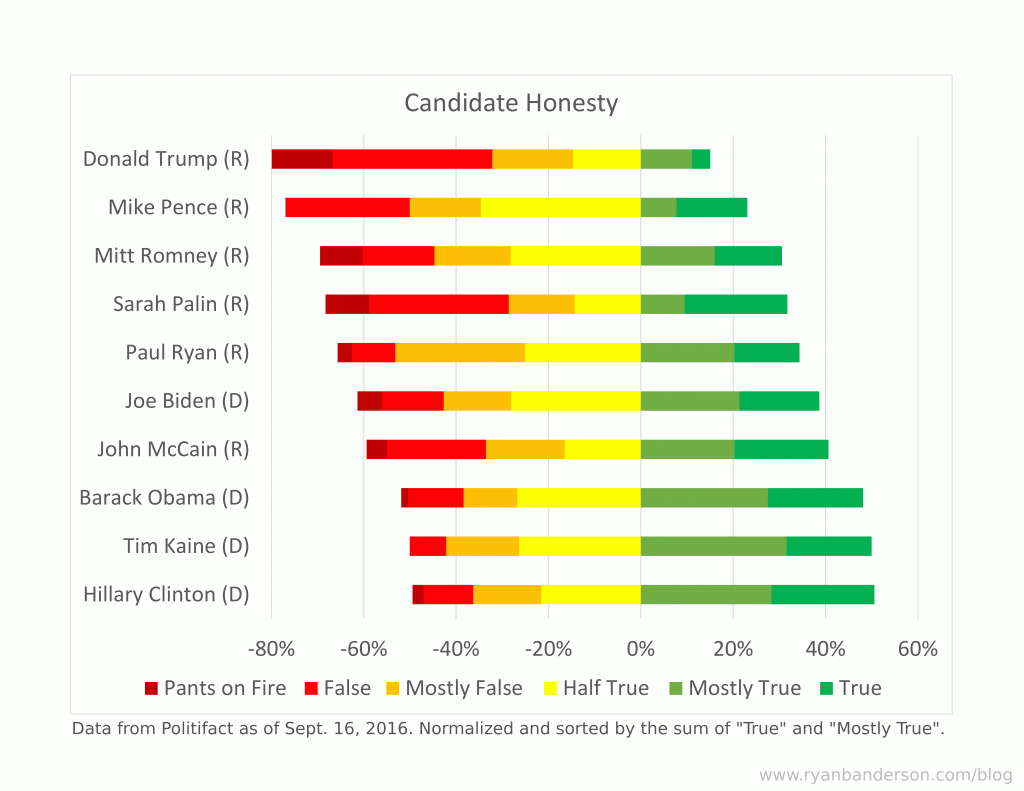
Let me put it this way: There are things that are true and things that are false.
- It is true that the planet is warming and that greenhouse gas emissions are a dominant factor. The best scientific models predict we are rapidly headed for a world of droughts and famine, refugees fleeing coastal cities, mass extinctions, more destructive storms, and more.
- It is true that voter fraud is vanishingly rare and that voter suppression is widespread.
- It is true that trickle-down economics doesn’t work, that cutting taxes on rich people just means they get richer while deficits skyrocket and poor people remain poor.
- It is true that police officers and indeed the entire criminal justice system exhibits bias against people of color, and that in many cases that has deadly results.
- It is true that having more guns leads to more gun deaths.
- It is true that sexual assault is common and false accusations of sexual assault are rare.
- It is true that health care cannot be treated as a free market and that doing so costs people’s lives.
- It is true that seeking asylum at our borders is not illegal, and that immigrants are less likely to commit crimes than native-born citizens, and that they provide a net benefit to the economy.
- It is true that the greatest threat of terrorism in this country comes from right-wing white men.
- It is true that the modern Republican party is following very closely along the path that led to the rise of fascism in pre-WWII Europe.
Do these statements sound partisan? They’re not. They’re just true. There should be nothing partisan about truth, yet the Republican party has worked so tirelessly at distorting the truth for so long that actual truth sounds like a liberal attack.
To solve the many and complex problems facing the world today, we must start with truth as a foundation. Lying to win elections harms everyone. Lying so regularly, so consistently, so deliberately that nearly half the country lives in an alternate reality where the facts are exactly reversed is literally threatening the stability of this country. In just the past week it has led to a mass assassination attempt, a racially motivated double-murder, and a massacre at a Jewish synagogue, and those are just the crimes that have made national headlines.
All of the true statements in the list above highlight real problems that need to be addressed, but we as a nation cannot address them if one party consistently, relentlessly, lies about all of them. It is enough to make a person think that Republicans are more interested in obtaining and holding power than they are in helping people.
Empathy
And that leads me to the second core value: empathy. I am not a religious person. I don’t think there is a being on high who determines what is right and wrong. Without an external definition of morality, I try to keep things simple: something is “Good” if it helps people, something is “Bad” if it harms people. The more people helped or harmed, the more good or bad. Empathy is the guide for this morality. If you want to do “good” and good is defined as what helps people, then by necessity you have to put yourself in their shoes and do unto them as you would have them do unto you. There is a reason the Golden Rule appears in every major religion.
I don’t think that there is an afterlife where we are rewarded or punished based on our actions in life. I think this is it. We get one life, and when it is over we are gone. The only things that remain are our genes, the people who remember us, and the changes we made in the world. That means I place a high value on making positive changes in the world. It means that I push myself to recognize how profoundly lucky I am, and that I take responsibility for my privileged life and try to pay some of my good fortune forward. Part of paying it forward is supporting policies that will help as many people as possible, even if that means I have to sacrifice a little bit.
When you look at the policies and behavior of the modern Republican party through the lens of empathy, it becomes clear that the party is completely morally bankrupt. Its policies are all about prioritizing the individual over the well-being of the broader society. An “every man for himself” mentality that promotes distrust and fear, rather than a “we’re in this together” mentality that promotes cooperation. Republicans reject the idea that there is a social contract and prefer to believe in the myth of the self-made man, ignoring the fact that the social contract is literally why humans are so successful as a species. (No, you might say, we are so successful because of our intelligence! But the leading theories of human evolution suggest that we evolved our intelligence primarily so that we could keep track of our social interactions among larger and larger groups. We are smart because we are social.)
Republican policies are just profoundly selfish. The obsession with taxes is the best example. Republicans prioritize a rich person’s right to obscene wealth over the well-being of society. Heaven forbid rich people pay a fraction of that wealth that will have no meaningful impact on their own lives for government services that could literally save other people’s lives. There appears to be this disturbing conflation among Republicans between wealth and morality. Rich people are rich because they somehow deserve to be. Poor people are poor because of some moral failing that makes them that way (typically laziness). The moment you suggest that success might not be entirely based on hard work, that some people work hard all their lives and remain in poverty while others are extremely successful and have sailed through life with minimal hardship, Republicans get upset.
There is also this strain of victimhood among Republicans that is fascinating and betrays a complete inability to put oneself in another person’s shoes. Republicans point to things like the #MeToo movement and Black Lives Matter as part of a broader societal shift that persecutes white men. They wring their hands over the possibility that false accusations of rape might ruin a man’s life ignoring the fact that (a) sexual assault or the threat thereof literally does ruin many women’s lives, and (b) credible accusations or even blatant admissions of sexual assault often carry little or no consequences (see, for example Donald Trump and Brett Kavanaugh).
“When you are accustomed to privilege, equality feels like oppression.” – Author Unknown
“Conservative” Christians likewise have a bizarre persecution complex that Republicans are only too happy to tap into. They claim there is a “War on Christmas” when Christmas dominates literally every aspect of American life for the last two months of the year. They claim persecution when people protest putting the Ten Commandments on government buildings or putting creationism in textbooks. Meanwhile actual religious minorities are victims of hate crimes like the recent massacre at a synagogue.
Possibly the worst of all to me is the attitude toward immigrants and refugees. It frankly terrifies me that someone could be so heartless and consumed by hate and fear that they see parents and children fleeing thousands of miles to build a better life and rather than welcoming them with open arms, Republicans think the logical response is to lock them up in prison camps. When confronted about why they are imprisoning children, they say “well, their parents shouldn’t have broken the law” as if that is a reasonable response. What a dark and terrifying fictional world Republicans live in.
Why I’m So Angry
The Republican party has become a party that whips up white nationalist fervor in its base to protect the staggering wealth of its donors and the power of its politicians. It is the party that cuts taxes on the rich and pays for them by cutting benefits for the poor. It locks children in cages. It cuts funding from schools. As I type, it is using American troops as props in a desperate stunt to whip up racist fear of a convoy of refugees desperate for a better life so that it can win an election. Across all issues, at all levels, if there is something that will benefit normal people, the Republican party is against it. If it will benefit the rich and powerful, they are for it.
They say that in any situation where you have two groups who disagree, that you should be careful not to fall into the trap of characterizing the other side as “Evil”. That when that happens, both groups will just become more and more entrenched and the differences between them will never be resolved and often will become worse.
But what happens when one side is genuinely evil? I looked it up and the definition of “evil” is “profoundly immoral” or “morally reprehensible” or “causing harm.” Explain to me how the Republican party does not fit that definition.
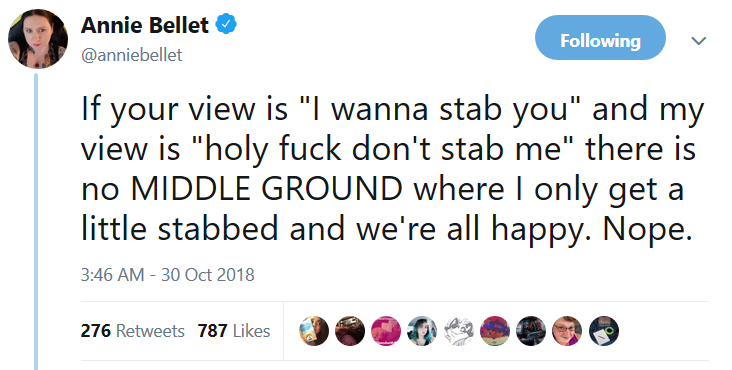
The Republican party is literally undermining the pillars of our democracy. They are preventing people from voting. They stole one Supreme Court seat and filled another with a horrible man because they knew he would rule in their favor. Experts in the ways in which democracies fail are sounding the alarm. The Republicans are following the playbook of the Nazi rise to power in Europe with terrifying precision. The president’s rhetoric has inspired his supporters to commit or attempt heinous acts of violence, and instead of walking the rhetoric back he and the rest of the party just double down. The Republican party is in favor of policies that will kill people and ruin lives, whereas the Democratic party is in favor of policies that might raise taxes or cut into corporate profits or allow brown people to live here in peace. You can’t look at that and shrug and say that it’s not clear which party is morally right.
The Republican party lies constantly to advance a profoundly selfish and immoral agenda. What they stand for goes against my two most deeply held values: Truth and Empathy.
That’s why I’m so angry. That’s why I can’t just ignore what is happening. That’s why I resist even when it would be easier not to.

